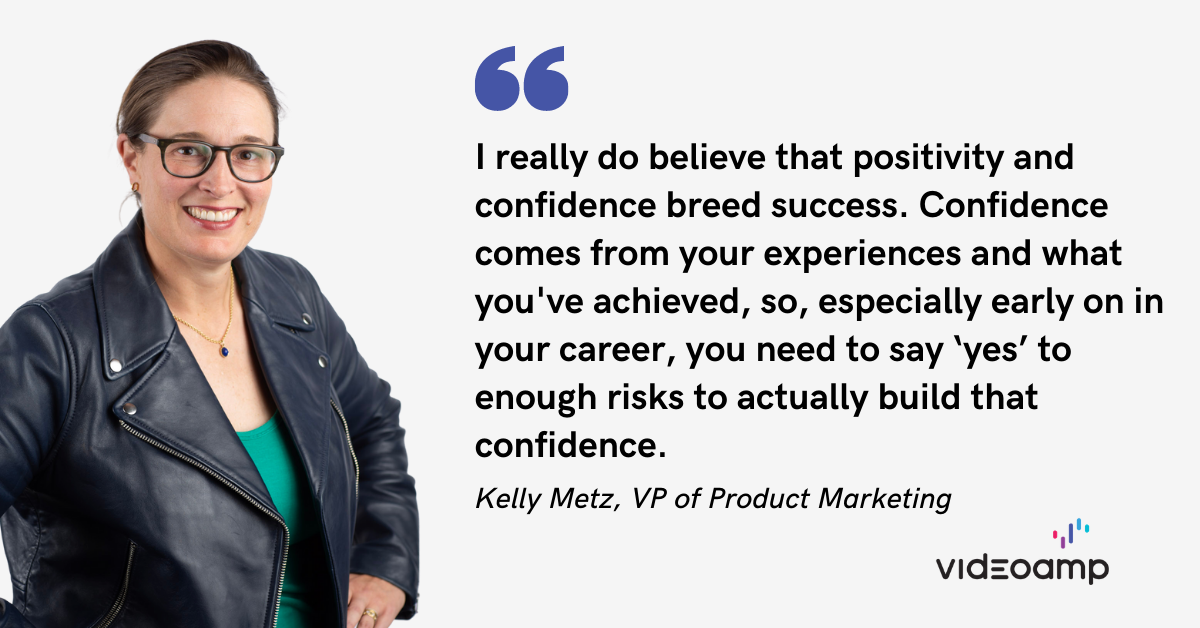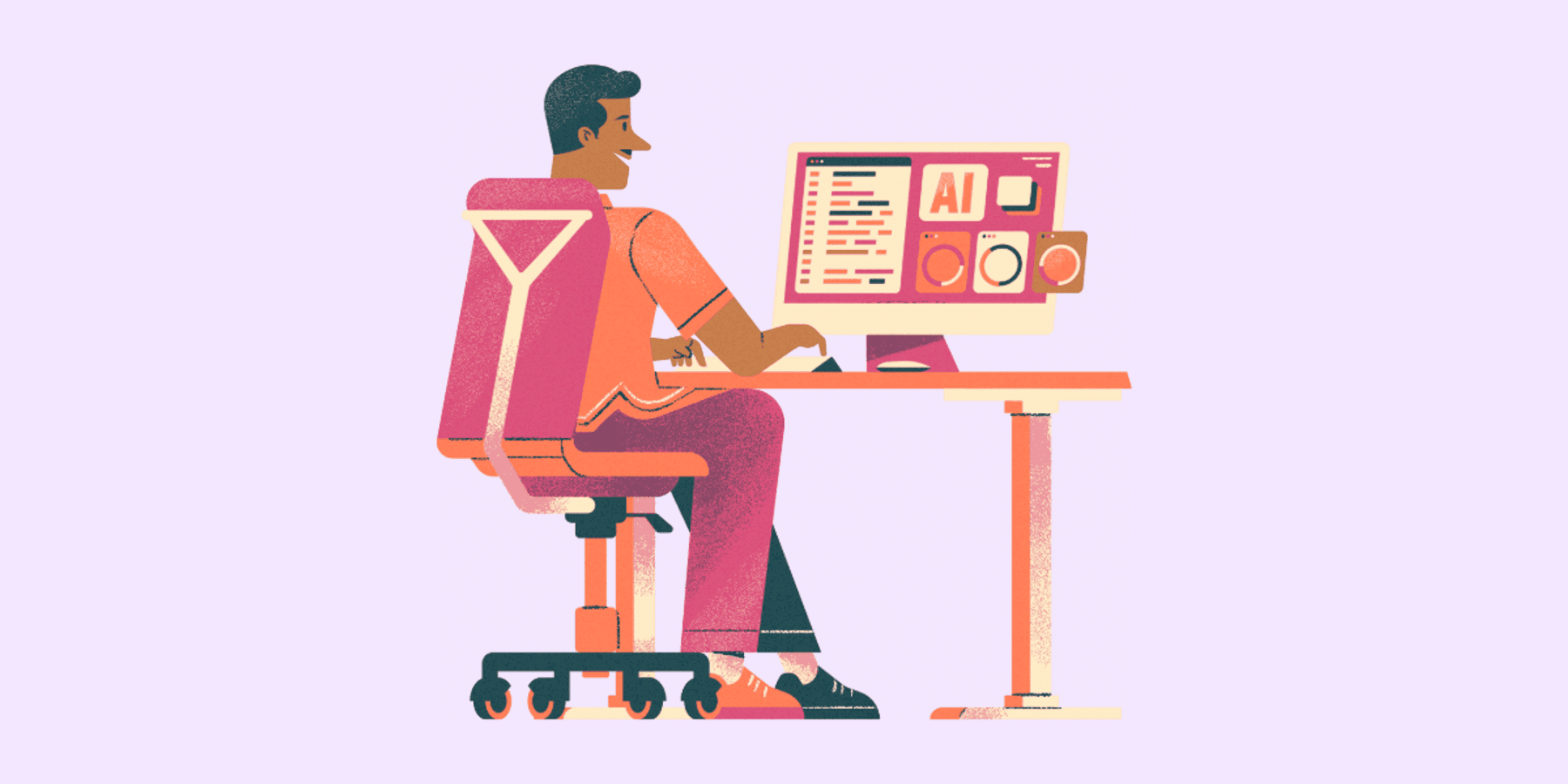Kelly Metz was on her thirtieth rewatch of a video her team was producing when it hit her: creativity wasn't her strong suit.
"I just missed the things my peers saw," explains Kelly. "I was blind to them."
It might surprise you to hear that from Kelly, who, now the VP of Product Marketing at advertising technology platform VideoAmp, has worked in various advertising roles over the course of her long career. But she owns the fact that she's not the most creative person (and that she's working to improve in that space, eager to learn from the people around her). Part of that is because she's very comfortable taking feedback and recognizing her weaknesses. And an equally important part of that is because she's fully confident in her strengths, knows what she brings to the table, and recognizes that the strongest team is one that's diverse, full of people who think differently and have different strengths.
"When you surround yourself with people that are really, really talented, you start to recognize that they see things differently. They have a lens I don't have. But I see things differently than they do. And I will comment on things they don't notice," she says.
We sat down with Kelly to talk about her career path, why she left bigger advertising firms to join a startup, and what advice she has for other women looking to take smart risks and make the most of them.
From dot-com startups to VideoAmp
Kelly started her career in technology and advertising and found that her first few years on the job were rich in learning and development opportunities. "It's just exponential learning in your twenties; it's fantastic," she explains. "Even reaching the director level didn't seem particularly momentous because it was just constant growth up to that point."
Starting out in tech during the dot-com bubble certainly contributed to this steep learning curve and fast pace. "At one point I was driving my own car to ship packages because we were in ecommerce and just trying to make the Christmas deadline," she says, laughing.
One of the first turning points in Kelly's career was when she decided to leave the world of scrappy dot-com startups and join software giant Oracle. There she took advantage of all of the training and coaching that they offered.
"It was a game changer for me," says Kelly. "They spend a lot of resources training their people. At smaller firms, especially during the internet bubble, everyone was new. There was no guidance or mentorship and you kind of had to just go with it."
She learned a lot at Oracle, including how to grow through discomfort and be a good manager of people (a key tip: never, ever skip a one-on-one). When she left the company after five years, she took those learnings with her, continuing to develop not only her understanding of the ad space, but of people management as well.
After five years as VP, Business Development at StudioNow in Nashville, Tennessee, Kelly felt ready for a change. She realized that she wanted two things: first, to move back to her hometown of LA and reunite with the Pacific Ocean, and two, to work at a growing startup with strong fundamentals where she could have an impact.
Enter VideoAmp.
Kelly says that she knew VideoAmp was the company for her not when she found out their headquarters were in Santa Monica (though that helped), but rather when she genuinely enjoyed her interviews with the team.
"The more corporate and rigid the interview structure, the more the culture is like that," says Kelly. "I'd done many rounds of interviews like that. At VideoAmp, everything was way more freeform. They were very inquisitive in the questions they asked. They were clearly curious. I felt like I wouldn't be hemmed into one role. And I'm very pleased with the decision I made to join."
Finding the right amount of risk
VideoAmp hired Kelly as their Director of Sales Engineering, but not long after joining she became their VP of Product Marketing. "I'd always been on the business development revenue side, and I became interested in product marketing because you're able to work across teams and impact the entire revenue chain," she explains.
She didn't have prior experience with product marketing, but she decided to reach out to VideoAmp's SVP of Marketing, Esther Maguire, who just so happened to sit across the office from her—in pre-pandemic days, that is—about an open spot on her team.
Now, as the VP of Product Marketing, Kelly is responsible for communicating what VideoAmp's technology can do to their clients and prospects. "You can't measure everything. So what are our clients' priorities and how are we delivering capabilities against those?" she says. That involves visualization, collaboration with designers and other creative types, and really strong communication skills.
Throughout her career, right up into that big switch from sales engineering to product marketing, Kelly has taken calculated risks. These risks have paid off for her, but they haven't been the result of indiscriminately saying yes to new opportunities. She has five key pieces of advice for anyone looking to embrace opportunity and advance their career:
1. Seek out discomfort. "I was never comfortable at Oracle, not for a moment," says Kelly. "And ultimately, if I hadn't had those five years of experience, I wouldn't have gotten where I am now." She notes that "if you're not uncomfortable, you're probably not growing fast enough," particularly if you're early in your career. If you're mid-career or late career, don't stop taking risks, but do make sure they're things that feel in line with your "true north," that is to say, your long-term career and life goals.
2. Set your comfort/risk ratio and live within it. Taking risks can feel like an amorphous challenge, which is why Kelly suggests spending some time reflecting on how much discomfort is right for you personally. For her, this ratio has fluctuated between 60-75% comfort and 40-25% risk. "I really do believe that positivity and confidence breed success," says Kelly. "Confidence comes from your experiences and what you've achieved, so, especially early on in your career, you need to say 'yes' to enough risks to actually build that confidence." The key takeaway? Confidence doesn't necessarily come from feeling comfortable—it comes from embracing opportunity and showing yourself that you're capable of meeting the challenge.
3. Assume the best of people. Part of taking on risks means that you might fail. You might be wrong. You might do something your team doesn't agree with. Kelly highlights how important it is to be open to feedback and advice and never assume that your team is out to get you. "When you're in a new situation and you're not yet as confident, it's easy to be defensive, but in the end, everyone's on the same team," she says. "Even when you think someone's feedback is wrong, challenge yourself to consider the possibility that they might be right and see how that changes your perspective."
4. Avoid "yes teams." When you're doing step three well, it makes it easier to have constructive disagreements and avoid groupthink or "yes teams—people who always say yes and do everything the same way." Kelly finds that truly diverse teams are much more successful: "It's teams that complement each other and challenge each other that make each other better."
5. Be a good listener. "Those who listen advance the farthest," says Kelly. "People want to be heard. Make sure you're accountable to who is speaking. Take notes, repeat it back, make sure you're capturing their intent. That will speak volumes to your desire to be there, to learn, and to have an impact."
If you're interested in learning more about growth opportunities at VideoAmp, check out their PowerToFly page here.




